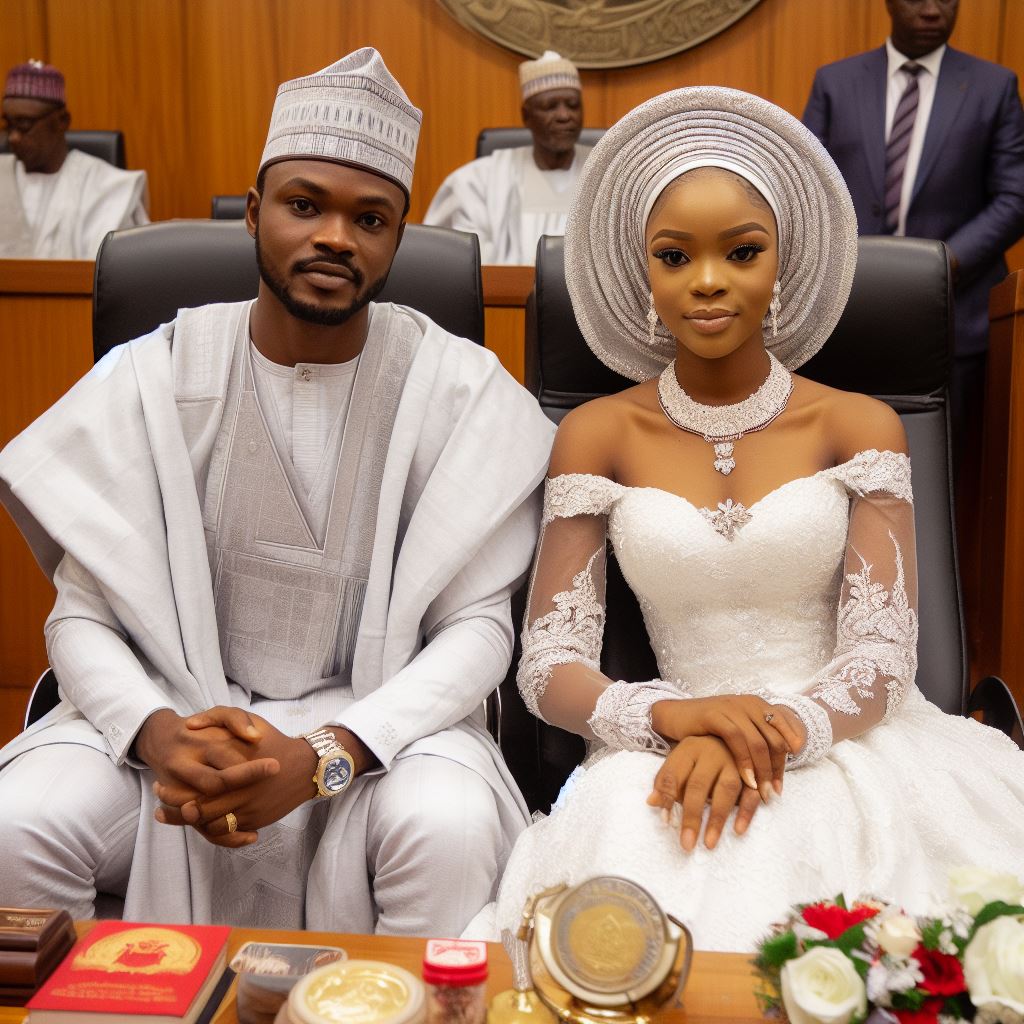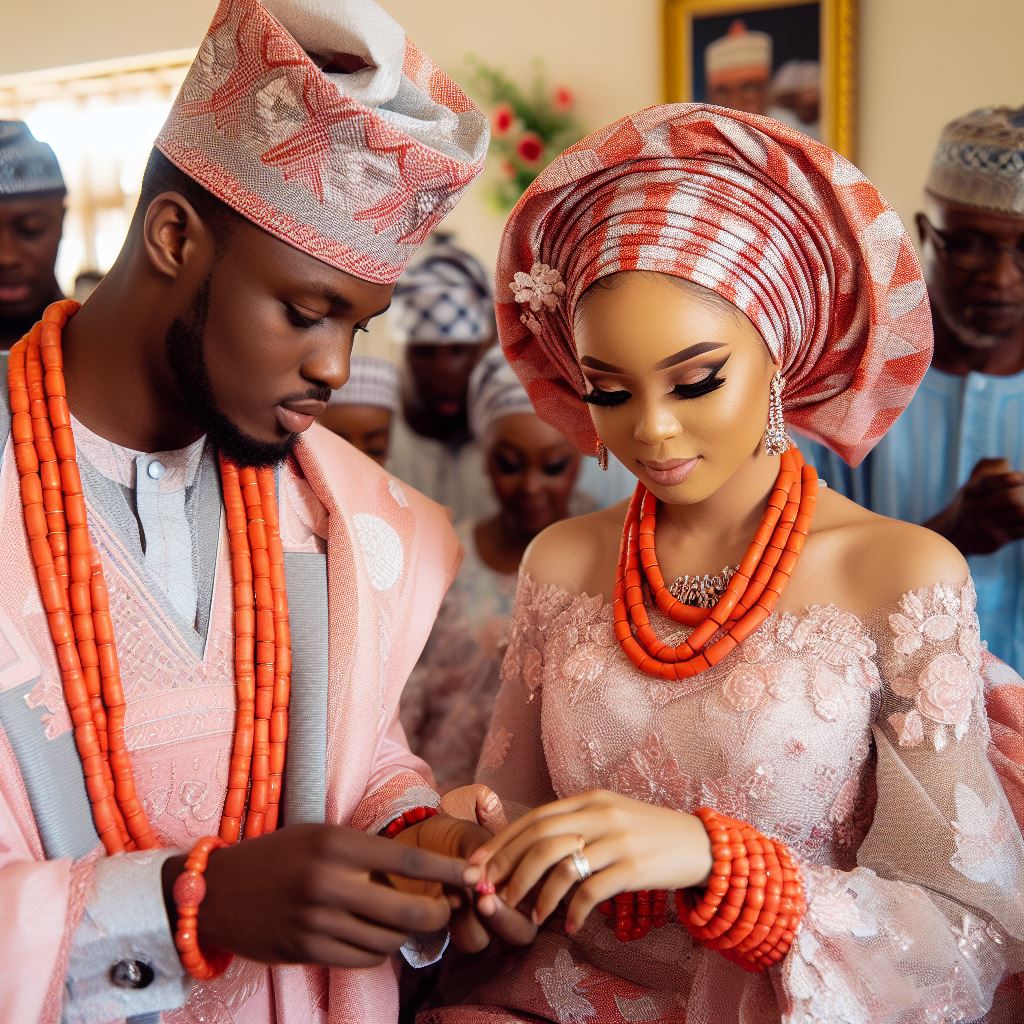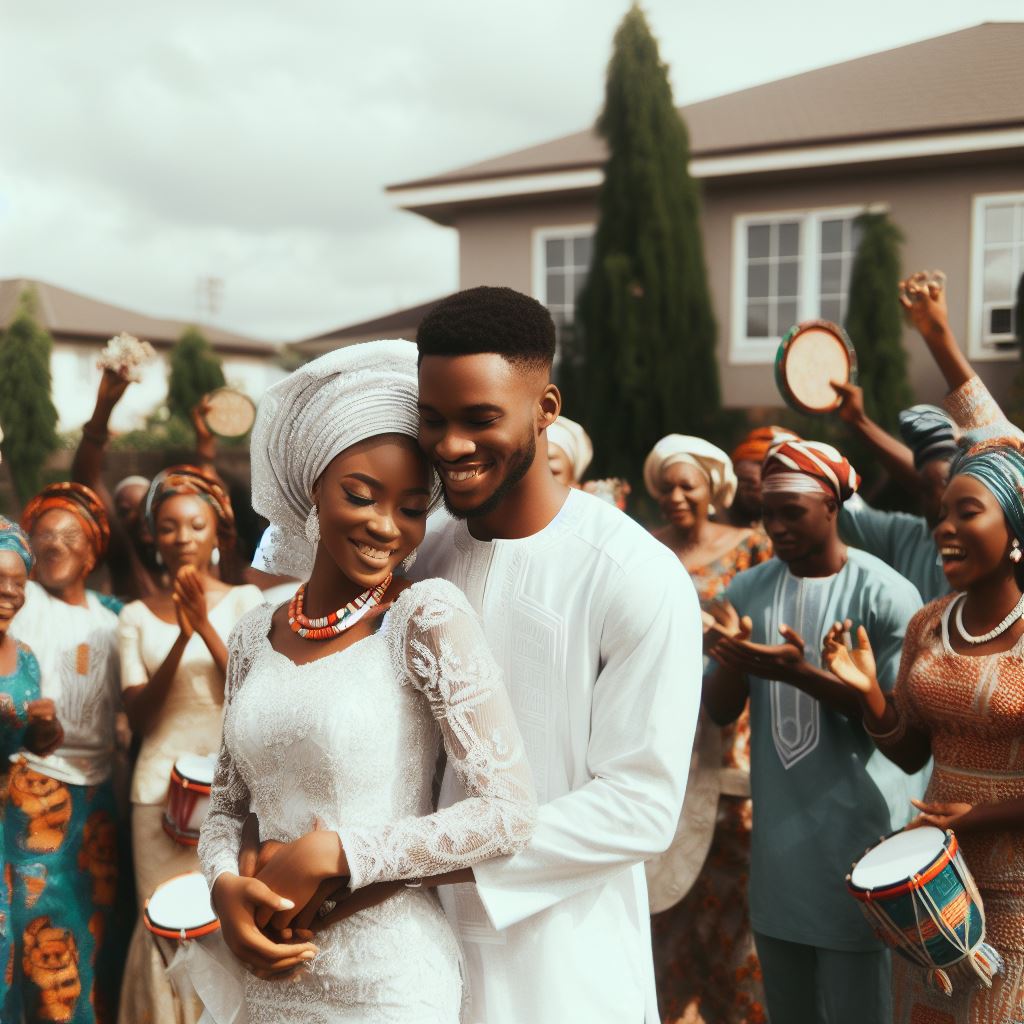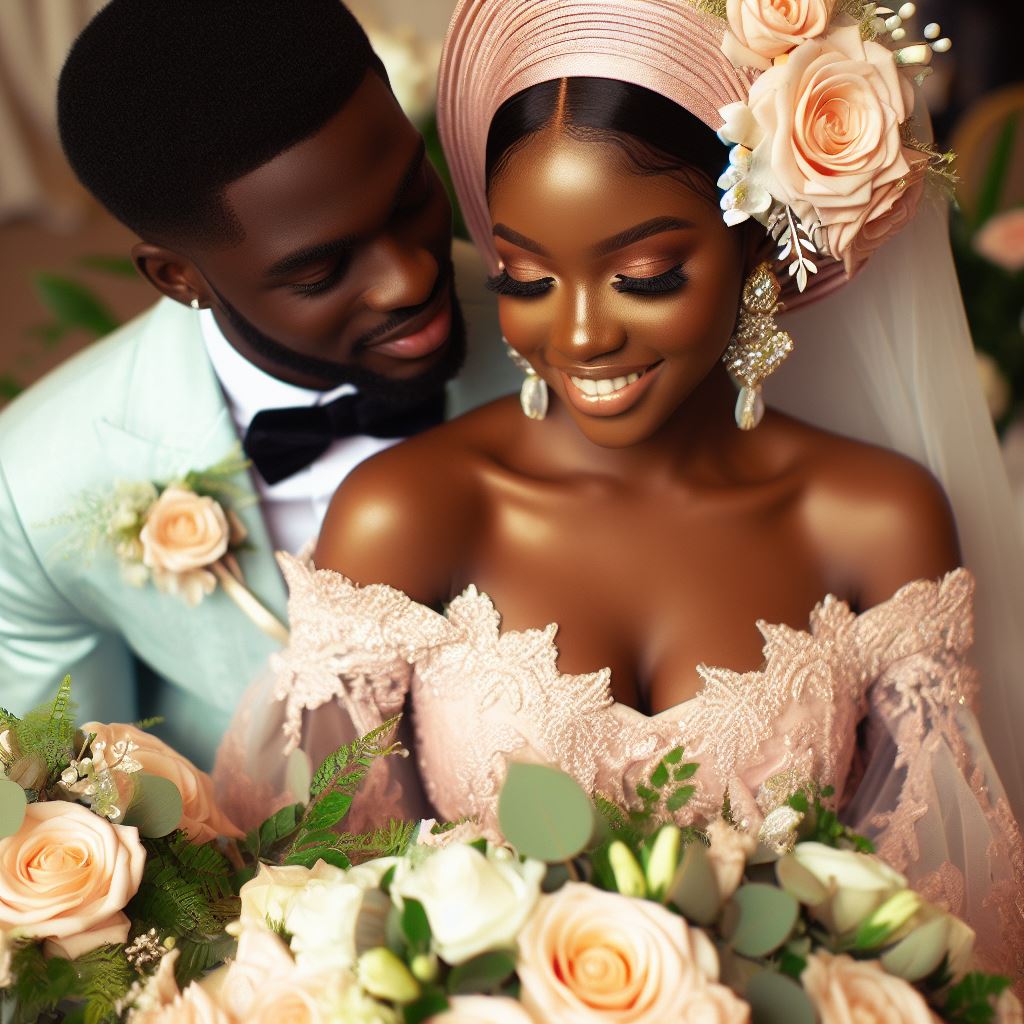Introduction
Nigerian wedding wishes are an essential part of celebrating a couple’s union and expressing good wishes for their future together.
Brief explanation of Nigerian wedding wishes
In Nigerian culture, wedding wishes are heartfelt messages or prayers offered to the newlyweds, often given during the wedding ceremony or reception.
These wishes serve as blessings for a happy and prosperous marital journey.
Importance of religious blessings in Nigerian culture
Religious blessings hold great significance in Nigerian culture as they invoke the divine presence and seek spiritual protection for the couple.
These blessings draw from various religious beliefs, including Christianity, Islam, traditional African religions, or a combination of them.
Religious blessings provide a sense of unity and support within the community, reinforcing the belief in the power of prayers to guide the couple through their married life.
Moreover, incorporating religious blessings in Nigerian wedding wishes showcases the nation’s rich cultural heritage, emphasizing the respect for faith and tradition.
Nigerian wedding wishes, incorporating religious blessings, instill hope, confidence, and celebrate love, unity, and divine support for a prosperous marriage.
Overview of Religious Diversity in Nigeria
Often called the “Giant of Africa,” Nigeria is renowned for its religious diversity.
With a population of over 200 million people, Nigeria is home to a wide range of religious beliefs and practices.
The major religious groups in Nigeria are Christianity, Islam, and Traditional African religions.
Christianity
- Christianity is one of the largest religions in Nigeria, with millions of adherents spread across various denominations.
- Christianity’s influence in Nigeria traces back to Christian missionaries’ arrival in the 19th century.
- Christianity plays a significant role in shaping Nigerian society, with many churches serving as social and spiritual hubs.
- Weddings in Christian Nigerian communities often incorporate religious blessings and prayers to seek divine guidance and blessings for the couple.
Islam
- Islam is another major religion in Nigeria, particularly prominent in the northern part of the country.
- Islam had an early presence in Nigeria, introduced as early as the 11th century, with a strong historical impact.
- Mosques and Islamic schools are integral parts of Nigerian communities, fostering religious education and devotion.
- Islamic Nigerian weddings commonly recite religious blessings for the couple, emphasizing love, unity, and commitment.
Traditional African Religions
- Traditional African religions, often referred to as indigenous beliefs, maintain a significant presence in Nigerian society.
- Various ethnic groups across the country deeply root these religions in their culture and traditions.
- Traditional religious practices often involve ceremonies, rituals, and the invocation of ancestral spirits.
- Incorporating religious blessings from traditional African religions during weddings is a way to honor ancestral heritage and seek divine favor.
The Significance of Religious Beliefs in Nigerian Society
Religious beliefs have a profound impact on Nigerian society. They influence people’s values, daily lives, and social interactions.
Religion in Nigeria provides individuals with a sense of identity, purpose, and a moral framework to navigate through life.
The importance of religious beliefs is evident in various aspects of Nigerian culture, including weddings.
Religious blessings in Nigerian weddings hold immense significance.
These blessings invoke divine favor, protection, and guidance for the couple’s journey, an essential aspect of starting a new life chapter and seeking divine blessings.
Incorporating religious blessings from Christianity, Islam, or traditional African religions in Nigerian wedding wishes demonstrates a reverence for the couple’s faith and cultural background.
It acknowledges the influence of religion in their lives and expresses well wishes for a harmonious and blessed union.
Incorporating Christian Blessings in Nigerian Wedding Wishes
Christian wedding traditions in Nigeria
Christian wedding traditions in Nigeria are deeply rooted in religious beliefs and cultural practices.
When sending wedding wishes to a Nigerian couple, it is essential to incorporate religious blessings to honor their faith and demonstrate your support.
By including biblical references and prayers, your wishes can have a profound impact and make the occasion even more meaningful.
Nigeria, often referred to as the “Giant of Africa,” is known for its diverse population and religious practices.
With a predominantly Christian population, Christianity plays a significant role in Nigerian weddings.
Incorporating Christian blessings in wedding wishes not only reflects the couple’s religious beliefs but also symbolizes the unity of their families and communities.
Christian wedding wishes with religious blessings
Christian wedding traditions in Nigeria are steeped in symbolism and follow a specific order of events.
It typically starts with a church ceremony, where the couple exchanges their vows and seeks God’s blessings.
The officiating minister plays a crucial role in leading prayers and reading biblical passages relevant to marriage.
These traditions aim to ensure that the couple begins their new journey grounded in faith and love.
Importance of including biblical references and prayers in wishes
When crafting wedding wishes with religious blessings, it is essential to choose words that resonate with the couple’s faith and the significance of their union. Here are some examples to inspire you:
- “May God grant you a marriage filled with love, joy, and unwavering faith. May He be your guiding light as you embark on this beautiful journey together.”
- “As you exchange vows, may the love of Christ bind you together, and may your marriage be a reflection of His everlasting love and grace.”
- “May your union be blessed with the fruit of the spirit: love, joy, peace, patience, kindness, goodness, faithfulness, gentleness, and self-control.”
- “May your wedding day mark the beginning of a lifelong commitment to walk hand in hand, leaning on one another and relying on God’s wisdom and strength.”
Including biblical references and prayers in wedding wishes adds a unique touch and elevates the importance of faith in the couple’s journey. Here are some scriptures you can incorporate:
- “Two are better than one because they have a good return for their labor: If either of them falls down, one can help the other up.” – Ecclesiastes 4:9-10
- “Love is patient, love is kind. It does not envy, it does not boast, it is not proud. It does not dishonor others, it is not self-seeking, it is not easily angered, it keeps no record of wrongs.” – 1 Corinthians 13:4-5
- “Therefore what God has joined together, let no one separate.” – Mark 10:9
Including these scriptural references will not only add depth to your wishes but also remind the couple of the divine blessings bestowed upon them.
Read: Common Mistakes to Avoid When Obtaining a Marriage Certificate
Incorporating Islamic blessings in Nigerian wedding wishes
Explanation of Islamic wedding traditions in Nigeria
Islamic wedding traditions in Nigeria, just like in other Muslim communities, hold deep cultural and religious significance. The ceremonies are based on Islamic teachings and involve various rituals.
The first step in an Islamic wedding is the proposal (nikah) made by the groom’s family. The bride’s family then discusses and agrees upon the dowry (mahr).
The actual wedding ceremony, known as the nikkah, involves the recitation of Quranic verses and the signing of a marriage contract. This is followed by a grand celebration, which includes feasting and dancing.
Examples of Islamic wedding wishes with religious blessings
When wishing a newlywed couple, incorporating religious blessings can add an extra touch of genuineness and sincerity to the message.
Here are a few examples:
- May Allah bless your marriage with love, happiness, and eternal togetherness.
- May your union be guided by the teachings of the Quran and shine with the light of Allah’s blessings.
- Wishing you a blessed marriage filled with peace, prosperity, and unwavering faith in Allah.
- May your journey together as husband and wife be filled with joy and tranquility, enveloped in Allah’s mercy.
Using Arabic blessings and verses from the Quran in wishes
Incorporating Arabic blessings and verses from the Quran in wedding wishes can enhance the religious aspect of the message. Here are a few examples:
- Baraka Allahu lakuma wa baraka ‘alaikuma wa jama’a baynakuma fi khayr.
May Allah bless you both and shower His blessings upon you both and may He join you together in goodness. - Qul rabbi awzini an ashkura ni’mataka allati an’amta ‘alayya wa ‘ala walidayya. Say: “My Lord! Inspire me to be grateful for Your favors which You have bestowed upon me and upon my parents.”
- Wa min ayatihi an khalaqa lakum min anfusikum azwajan litaskunoo ilayha waja’ala baynakum mawaddatan warahmatan.
And of His signs is that He created for you from yourselves mates that you may find tranquility in them; and He placed between you affection and mercy. - Rabbana hab lana min azwajina wadhuriyyatina qurrata a’yunin wa-jalna lil-muttaqina imama.
Our Lord, grant us from among our wives and offspring comfort to our eyes and make us an example for the righteous.
Incorporating religious blessings into Nigerian wedding wishes, particularly Islamic ones, adds a deep spiritual element to the celebration.
It shows respect for the couple’s faith and invokes the blessings of Allah for their union.
By using Arabic blessings and verses from the Quran, the wishes become even more meaningful and connect directly to the couple’s religious traditions.
Whether written on a card, shared in person, or sent as a text message, these well-wishes will touch the hearts of the couple and remind them of their commitment to each other and to their faith.
Read: The Role of Witnesses in Securing a Nigerian Marriage Certificate
Incorporating Religious Blessings in Nigerian Wedding Wishes
Weddings in Nigeria hold great significance and are often celebrated with religious fervor.
The incorporation of traditional African religious blessings adds a special touch to the wedding wishes, making them even more heartfelt and memorable.
Incorporating Traditional African Religious Blessings in Nigerian Wedding Wishes
Nigerian weddings are a beautiful blend of cultural traditions, and incorporating traditional African religious blessings is a way to pay homage to the rich cultural heritage.
It adds depth and authenticity to the wedding wishes, connecting the couple to their roots.
Traditional African wedding traditions are diverse and unique, varying from tribe to tribe in Nigeria.
These traditions are deeply rooted in spirituality and are often centered around invoking the blessings of ancestral spirits and gods.
Exploration of Traditional African Wedding Traditions in Nigeria
Traditional Nigerian weddings are characterized by vibrant colors, lively music, and elaborate ceremonies.
Each tribe has its distinct way of celebrating this joyous occasion while incorporating religious elements.
In Yoruba weddings, for example, the couple performs a ceremony called “Omo Iya Agbe,” where they request the blessings of their ancestors.
This ceremony involves pouring libations and offering prayers to the gods and ancestors for fertility and a prosperous union.
In Igbo weddings, the couple seeks the blessings of their ancestors by performing the “Igba Nkwu” ceremony.
This involves breaking kolanuts, offering prayers, and pouring libations to invoke the presence and guidance of the ancestral spirits.
Hausa weddings, on the other hand, place a strong emphasis on Islamic traditions, as Islam is the predominant religion in the region.
Some couples may choose to integrate traditional African religious blessings into their wishes.
Examples of Traditional African Wedding Wishes with Religious Blessings
- May the ancestral spirits and gods bless your union with love, happiness, and prosperity.
- May your marriage be as strong as the spirits of our ancestors, guiding you through all challenges.
- May the gods grant you a bond that is unbreakable, filled with joy and everlasting love.
- As you begin this sacred journey, may the blessings of the ancestors be with you every step of the way.
Highlighting the Importance of Invoking Ancestral Spirits and Gods in Wishes
The inclusion of traditional African religious blessings in Nigerian wedding wishes serves as a reminder of the importance of honoring ancestors and gods.
It acknowledges the belief that the spirits of the deceased continue to watch over and guide the living.
These blessings also reflect the desire for a strong foundation and a harmonious union. By invoking the ancestral spirits and gods, couples seek their protection and blessings for a successful and blissful marriage.
Incorporating traditional African religious blessings into Nigerian wedding wishes adds depth and cultural significance to these special occasions.
It allows couples to honor their heritage while seeking the blessings of the ancestral spirits and gods for a prosperous and joyful union.
Read: FAQs: Getting Your Marriage Certificate in Nigeria
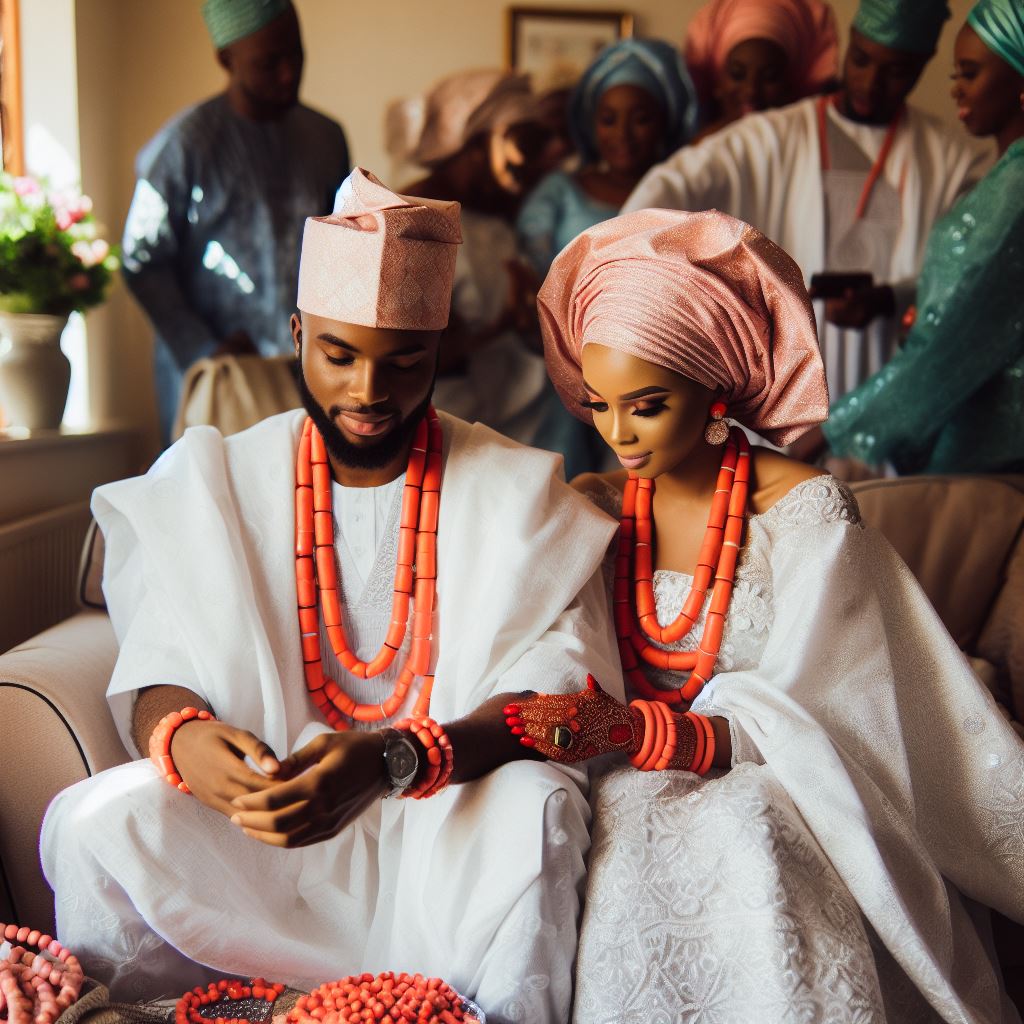
Balancing religious diversity in Nigerian wedding wishes
In a country like Nigeria where religious diversity is significant, it is necessary to strike a balance when expressing wedding wishes.
It is essential to include blessings from different religious traditions to make everyone involved feel respected and valued.
The challenges of incorporating different religious blessings in wishes
One of the main challenges in creating wedding wishes that incorporate different religious blessings is the potential for conflict or offending someone’s religious beliefs.
Some blessings or prayers may contradict or clash with each other, causing discomfort to the couple or their families.
Encouraging inclusive wishes that respect and embrace all religious beliefs
While it may be challenging, it is important to encourage inclusive wedding wishes that respect and embrace all religious beliefs.
This means acknowledging and including blessings and prayers from different religious traditions without prioritizing or favoring one over the others.
Suggestions on how to blend religious blessings from different traditions
To blend religious blessings from different traditions effectively, it helps to research and understand the customs and practices associated with each religion.
You can incorporate common elements or themes into the wedding wishes by finding them during this process.
Here are some suggestions on how to blend religious blessings from different traditions:
- Research the different religious traditions involved in the wedding and their significance in the lives of the couple and their families.
- Identify common values or themes across different religious traditions, such as love, unity, and happiness.
- Create wedding wishes that emphasize common values and themes, ensuring no favoritism toward specific religious traditions.
- Acknowledge and include specific blessings or prayers from each religious tradition, ensuring that they are respectful and do not contradict or offend any other religious beliefs.
- Consult with religious leaders or elders from each tradition to ensure the blessings are accurately represented and interpreted.
By following these suggestions, it is possible to create wedding wishes that incorporate different religious blessings in a respectful and inclusive manner.
This will help ensure that all individuals involved feel valued and respected for their religious beliefs.
Read: The Cost Breakdown: Obtaining a Marriage Certificate in Nigeria
Conclusion
Religious blessings hold great significance in Nigerian wedding wishes as they bring blessings and well wishes to the couple’s married life.
They also represent the deep-rooted religious beliefs and cultural identity of the Nigerian people.
Recap of the Significance of Religious Blessings in Nigerian Wedding Wishes
Religious blessings in Nigerian wedding wishes serve as a way to invoke divine blessings and protection for the couple. These blessings symbolize the community’s prayers for a joyful and prosperous married life.
Encouragement to Incorporate Religious Blessings in Wedding Wishes as a Sign of Respect and Cultural Identity
It is highly encouraged to incorporate religious blessings in wedding wishes when celebrating Nigerian weddings.
By doing so, we show respect for the couple’s faith and cultural traditions, fostering a sense of unity and understanding.
Moreover, adding religious blessings in wedding wishes acknowledges the spiritual dimension of marriage, strengthening the couple’s bond and inviting divine guidance throughout their journey together.
Incorporating religious blessings in wedding wishes is not only a way to honor the couple’s cultural identity but also a beautiful gesture that reflects the rich tapestry of Nigerian traditions and beliefs.
If you’re a family member, friend, or well-wisher, infuse your wedding wishes with religious blessings, bestowing love and divine blessings.

